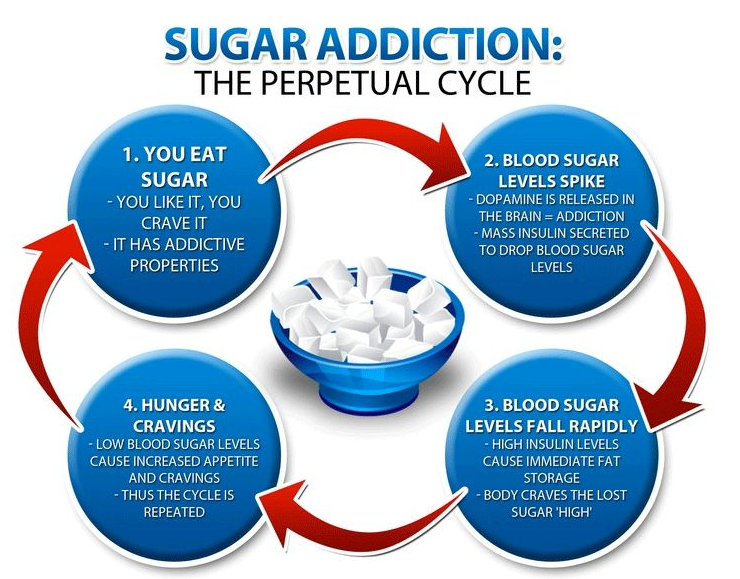
Sugar: the delectable ingredient ubiquitous in our modern diets, every present in processed foods, desserts, and beverages. Its sweet taste brings instant pleasure to most, its impact on mental health is a topic that’s gaining increasing attention from researchers and health professionals alike. The connection between sugar and mental health might not be immediately obvious, after all, sugar is primarily associated with metabolic concerns such as obesity and diabetes. Emerging research suggests that excessive sugar consumption may also have significant implications for our mental well-being.
Mood
One of the primary ways in which sugar affects mental health is through its impact on mood. We’ve all experienced the initial surge of energy and euphoria that comes after indulging in a sugary treat. This is due to the rapid spike in blood sugar levels, which triggers the release of feel-good neurotransmitters like dopamine in the brain. However, this euphoria is often short-lived, followed by a crash that leaves us feeling tired, irritable, and anxious. This rollercoaster effect can take a toll on our overall mood stability and contribute to symptoms of depression and anxiety. Furthermore, chronic consumption of high-sugar diets has been linked to inflammation in the brain. This inflammation has been implicated in the development of various mental health disorders, including depression, schizophrenia, and Alzheimer’s disease. Additionally, excessive sugar intake has been shown to impair the function of brain-derived neurotrophic factor (BDNF), a protein that plays a crucial role in neuronal growth and synaptic plasticity. Reduced levels of BDNF have been associated with an increased risk of mood disorders and cognitive decline.
Addiction
Evidence exists to suggest that sugar may have addictive properties similar to drugs of abuse. Consuming sugar activates the brain’s reward system in much the same way as addictive substances, leading to cravings and compulsive consumption. For individuals susceptible to addiction, this can create a vicious cycle of sugar dependence that further exacerbates mental health issues.
Sugar’s Many Faces
It’s important to note that not all sugars are created equal. While naturally occurring sugars found in fruits and vegetables are accompanied by fiber, vitamins, and minerals that may promote overall health, the body does not recognize the difference between these sugars and those found in processed foods. The body’s hormonal and inflammatory responses are the same and can be particularly detrimental to mental well-being when consumed in excess. Fruit juices are notorious culprits of massive infusions of sugar into the body.
This is understanably confusing to many as fruits and vegetables have been hailed as wholly healthy by the doctors world wide, and they are for most people. However, sugar is not an essential nutrient the body requires. Unlike essential fatty acids and essential amino acids the body requires to function properly there are no essential sugars. If you have existing mental or metabolic health issues even naturally occuring sugars may exasperate those issues. An apple a day may keep the doctor away but too many apples may just be the reason for your doctor’s visit.
What To Do
So, what can we do to protect our mental health in the face of our sugar-laden environment? Firstly, awareness is key. Moderate, if not eliminate, sugar in your diet. Learning to recognize the many disguises of sugar by educating ourselves about the hidden sources of sugar in our diets and making conscious choices to limit our intake can go a long way in safeguarding our mental well-being. Opt for whole, unprocessed foods whenever possible and exercise daily to regulate blood sugar and insulin levels to mitigate the negative effects of sugar on mental and metabolic health.
Life is short, don’t deprive yourself but understand the momentary sense of pleasure that sugar provides may bring long-term impact on mental health, which is anything but sweet. By being mindful of our sugar consumption and prioritizing a balanced diet and healthy lifestyle habits, we can support not only our physical health but also our mental well-being for years to come.
Everyday is a New Day – Reap What You Sow
—
Struggling with Anxiety, Depression, or Weight Loss?
At Herstel Health, we consider the whole person. The mind and the body. Mental Health and Metabolic Health. Improving both together creates a harmonious state where you can thrive. The human being is an amazing organism with a tremendous capacity for self-healing whether regenerative growth from injury or fighting pathogenic invasion. Much of the illness and chronic disease we experience are rooted in metabolic disfunction and mental difficulties.
Schedule a FREE consultation today: www.HerstelHealth.com

